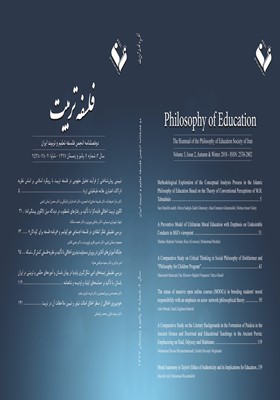بررسی دیدگاه پل هرست در باب تربیت دینی بر مبنای تئوری تربیت فضیلتمحور افلاطون
محورهای موضوعی :مریم سلطاتی کوهانستانی 1 * , عباس فنی اصل 2
1 -
2 -
کلید واژه: پل هرست, افلاطون, عقلانیت, تربیت دینی, تربیت فضیلتمحور, تربیت لیبرال.,
چکیده مقاله :
هرست متفکر تحلیلی معاصر، امکان تربیت دینی را به دلیل الزامآور بودن و در نتیجه سلب امکان زیست انتقادی و خلاقانه از متربی، بیمعنا و متناقض و مانعی برای رشد او میداند. به زعم هرست، غایت تربیت، آزاد ساختن ذهن متربی از هر آن چیزی است که ذهن را از کارکرد خاص آن -عقلانیت- به دور میدارد، یعنی رهایی اندیشه و فعل آدمی از خطا و اشتباه بدون هیچگونه الزام بیرونی. این همان تربیت آزاد در زبان هرست و تربیت فضیلتمحور در یونان باستان است که پیشینهی آن به افلاطون بازمیگردد. از آنجا که تربیت فضیلتمحور نوعی از عقلانیت را میطلبد، بین افلاطون و هرست تفاوتی نیست؛ اما افلاطون هرگز تربیت فضیلتمحور را هم عرض تربیت دینی قرار نداده است، بلکه همواره تربیت فضیلتمحور را فروتر از تربیت دینی شناسانده است، همعرضی آنها به حسب اعتبار آن دو است والا تقابل میان آنها، تقابل طولی است؛ زیرا مطابق مابعدالطبیعهی افلاطونی تربیت فضیلتمحور منهای دین، توقف سیر تکاملی متربی را به همراه خواهد داشت. از منظر افلاطون، زمانی که تعارض اصول تربیتی با یکدیگر روی میدهد، نوعی اصول تربیتی غیرتجربی و غیراستدلالی منبعث از معرفت شهودی ضروری است؛ اصولی که در نظریهی تربیتی هرست نفی شده است.
Hirst, the contemporary analytical thinker, considers the religious education impossible; because he believes that it is a compulsory education and thus it will deprive the student of the opportunity to live a critical and creative life, therefore, it is meaningless and impedes the student's intellectual development. According to Hirst, the goal of education is to liberate the mind from all that excludes the mind from its particular function, rationality, the liberation of thought and action of human from error and without any external necessity. This is the virtuous cultivation that goes back to Plato. Given that virtuous cultivation requires a kind of rationality, there is no difference between Plato and Hirst; however, Plato did not devote himself in any of his works to the virtuous cultivation of religious education, but has always identified virtue-based education at a lower level of religious education. Their difference is in accordance with their validities, and the contrast between them is in a vertical relation, because according to Platonic metaphysics, virtue-based education, with the exception of religion, will end the evolutionary process. On the other hand, the result of rejecting religious education and accepting the plurality of cultures in Hirst's theory of education is a negation to the educational principles. From the point of view of Plato, when a conflict occurs among the principles of education, it is necessary to derive non-experimental and non-deductive principles for education from intuitive judgments; the principles that have been neglected in Hirst's theory of education.

